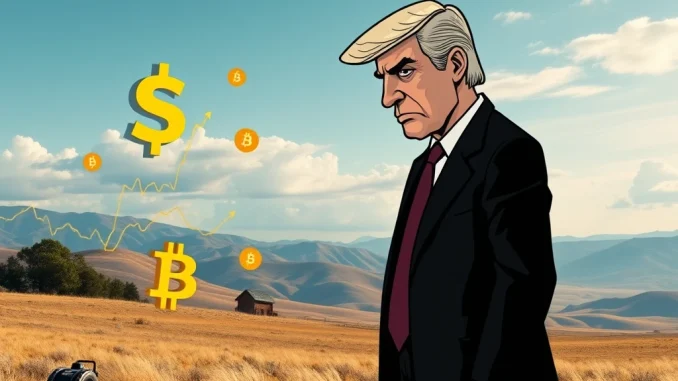
Minneapolis Fed President Neel Kashkari recently delivered a blunt assessment of cryptocurrency, sparking significant discussion within the digital asset community and traditional financial circles. His remarks, shared via First Squawk on X, cut straight to the heart of a long-standing debate: the practical value of crypto in established, advanced economies.
Understanding the Fed’s Stance on Cryptocurrency Utility
Neel Kashkari, a prominent voice within the Federal Reserve system, didn’t mince words. He stated that in developed countries with sophisticated financial systems, crypto utility remains elusive, even after 15 years since Bitcoin’s inception. This isn’t the first time a central banker has expressed skepticism, but Kashkari’s directness highlights a persistent view from some corners of traditional finance.
His core argument centers on the lack of a compelling, widespread use case for cryptocurrency that genuinely improves upon existing systems in countries with stable currencies, efficient payment networks, and robust legal frameworks. From this perspective, crypto often appears more like a speculative asset or a tool for illicit activity rather than a foundational technology for daily economic life.
Neel Kashkari’s View: 15 Years Without a Use Case?
The assertion that 15 years have passed without a clear use case emerging is a key point of contention. While proponents point to various applications, Kashkari’s comments suggest these haven’t reached a scale or significance that, in his view, justifies crypto’s existence alongside traditional financial instruments in developed nations.
What might lead someone like Neel Kashkari to this conclusion? Several factors are often cited by critics:
- Volatility: High price swings make cryptocurrencies impractical for everyday transactions or as a stable store of value compared to national currencies.
- Scalability Issues: Some blockchains struggle to handle transaction volumes comparable to traditional payment systems.
- Complexity: Using crypto can be technically challenging for the average person.
- Regulatory Uncertainty: The unclear legal status in many jurisdictions hinders mainstream adoption by businesses and consumers.
From the perspective of the Fed on crypto, maintaining financial stability and ensuring the safety and efficiency of the payment system are paramount. Volatile, unregulated, or less understood assets like cryptocurrency can be seen as potential risks to these goals.
The Ongoing Debate: Is There Crypto Utility in Developed Countries?
Despite Kashkari’s criticism, the crypto community argues that use cases *do* exist and are growing, even in developed economies. These include:
- Store of Value: Bitcoin is often viewed as ‘digital gold’ – an alternative asset class for hedging against inflation or economic uncertainty.
- Decentralized Finance (DeFi): Providing alternative financial services (lending, borrowing, trading) without traditional intermediaries.
- Programmable Money: Smart contracts enabling automated transactions and complex financial agreements.
- Digital Ownership: Non-Fungible Tokens (NFTs) representing unique digital assets.
- Cross-Border Payments: While perhaps more critical in developing nations, crypto can offer faster and cheaper remittances in certain corridors.
This divergence highlights a fundamental difference in perspective. Traditional finance often looks for crypto to replicate or significantly improve existing functions in a risk-managed way, while crypto proponents emphasize new paradigms, censorship resistance, and alternatives outside traditional control.
Crypto Regulation: Whose Job Is It?
Beyond utility, Kashkari also addressed the regulatory aspect, stating unequivocally that crypto regulation is the job of Congress. This aligns with the current landscape in the United States, where various government bodies have overlapping or unclear jurisdiction over different aspects of the crypto market (e.g., SEC, CFTC, Treasury, Fed).
Placing the responsibility squarely on Congress underscores the need for legislative clarity. Comprehensive regulation could address investor protection, market integrity, and the prevention of illicit finance. However, the path to clear, unified crypto regulation in Congress has been slow and complex, reflecting diverse opinions on how crypto should be treated.
The statement from Neel Kashkari, a high-profile figure in the Federal Reserve, adds another layer to the ongoing policy discussions in Washington. His view that crypto lacks essential utility could influence how policymakers perceive the urgency and nature of regulation.
Actionable Insights from the Fed’s Perspective
For those involved in the crypto space, comments like Kashkari’s serve as a reminder of the challenges in gaining acceptance from traditional financial institutions and regulators. Key takeaways include:
- Understand the Skepticism: Recognize the specific points of concern from traditional finance (volatility, lack of perceived ‘real’ use, risks).
- Focus on Demonstrating Utility: The industry needs to clearly articulate and build applications that offer tangible, superior value propositions beyond speculation, especially in developed markets.
- Engage with Policymakers: Participate in the crypto regulation debate, providing education and input to help shape informed legislation.
- Prepare for Regulation: Assume that regulatory frameworks will evolve, and build compliance considerations into projects.
The debate over crypto’s place in developed economies is far from over. While figures like Neel Kashkari express strong reservations, the technology continues to evolve, and its adoption, in various forms, persists.
Summary: A Critical View from the Fed
In conclusion, Minneapolis Fed President Neel Kashkari’s recent remarks present a significant challenge to the narrative of crypto’s inevitability, particularly in established economies. By calling cryptocurrency useless in developed countries and highlighting the 15-year lack of a clear use case from his perspective, he voiced a view held by some within traditional finance. His assertion that crypto regulation is Congress’s domain also points to the ongoing need for legislative action.
While the crypto community counters these points with examples of growing crypto utility and innovation, the critical assessment from a figure like Neel Kashkari underscores the hurdles the industry faces in achieving mainstream acceptance and navigating the complex path toward clear and effective Fed on crypto policy and broader regulation.



